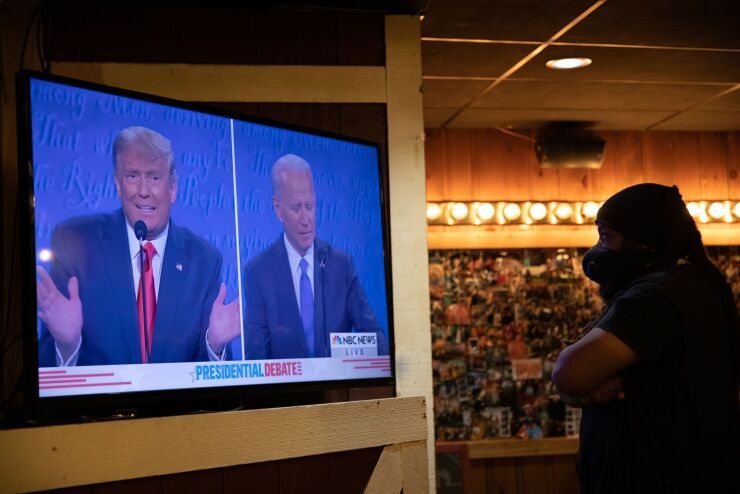As the U.S. presidential election approaches, many financial advisors find themselves fielding the same question from clients: Will my investments be OK?
The question takes many forms: Will a contentious campaign disrupt stocks? If
"Plenty of clients have their worries, no matter which way they vote," said Andrew Herzog, a wealth advisor at
To answer these questions, advisors can point to the data. A
Throughout history, the U.S. stock market has proven remarkably resilient under both Republican and Democratic leadership. In fact, since 1961, the S&P 500 has only lost ground under two presidents: Richard Nixon and George W. Bush.
As for the transition period between presidents, stocks climbed during even the most volatile successions. In the two months between Donald Trump's upset victory in November 2016 and his inauguration in January 2017, the S&P 500 gained 6.2%. And in the period between Joe Biden's election and inauguration — a phase that included a violent insurrection — the S&P gained 14.3%.
"In most cases, the S&P 500 posted positive returns between election day and inauguration day, regardless of who wins the presidency," YCharts wrote.
READ MORE:
And for nervous clients thinking of dumping their stocks if the "wrong" candidate wins, the study offers a hypothetical scenario: If a stockholder only invested in the S&P 500 during Democratic presidencies from 1950 to today, they'd get an annualized return of 5.1%. If they only invested during Republican presidencies, that return would be 2.8%.
Or, if the person stayed invested the whole time, under both Democrats and Republicans, their return would be 8.1%. The lesson is clear: It does not pay to play politics with one's investments.
"Making investment decisions based on who's in office usually hurts portfolio performance," Herzog said. "Let's not assume the executive branch has more power than it really does to control markets."
And yet some wealth managers can recall clients who did exactly that — or at least contemplated it in a moment of anxiety.
One of those advisors is Rob Arnott, founder of the investment firm Research Affiliates and a portfolio manager at
"He was terrified, and he said, 'I want to sell all my stocks,'" he said.
Arnott believes this is just one example of a broader phenomenon: In a country as polarized as the United States,
"In the run-up to the election, both camps are concerned — they're scared of the outcome — and they will tend to go risk-off," Arnott said. "When the election happens, one of those two groups is going to be happy with the outcome, and will go risk-on. The other group is unhappy with the election, but they're already risk-off."
READ MORE:
The result is that these two camps — risk-friendly and risk-averse — don't just cancel each other out, and stocks don't just stabilize. They soar.
Knowing this, Arnott offered some sound advice before his client could unload his investments.
"I said, 'Please don't,'" he recalled. "'Or if you do, sell your stocks a month or two after the election, because there's liable to be this snap-back effect.' Sure enough, there was a big snap-back, and he decided not to sell the stocks after all."
As
"Over the last century, the U.S. equity markets have ultimately appreciated through wars and depressions, as well as numerous different presidents of different political parties," Herzog said. "Staying invested and focused on your goal is the most prudent thing to do."






